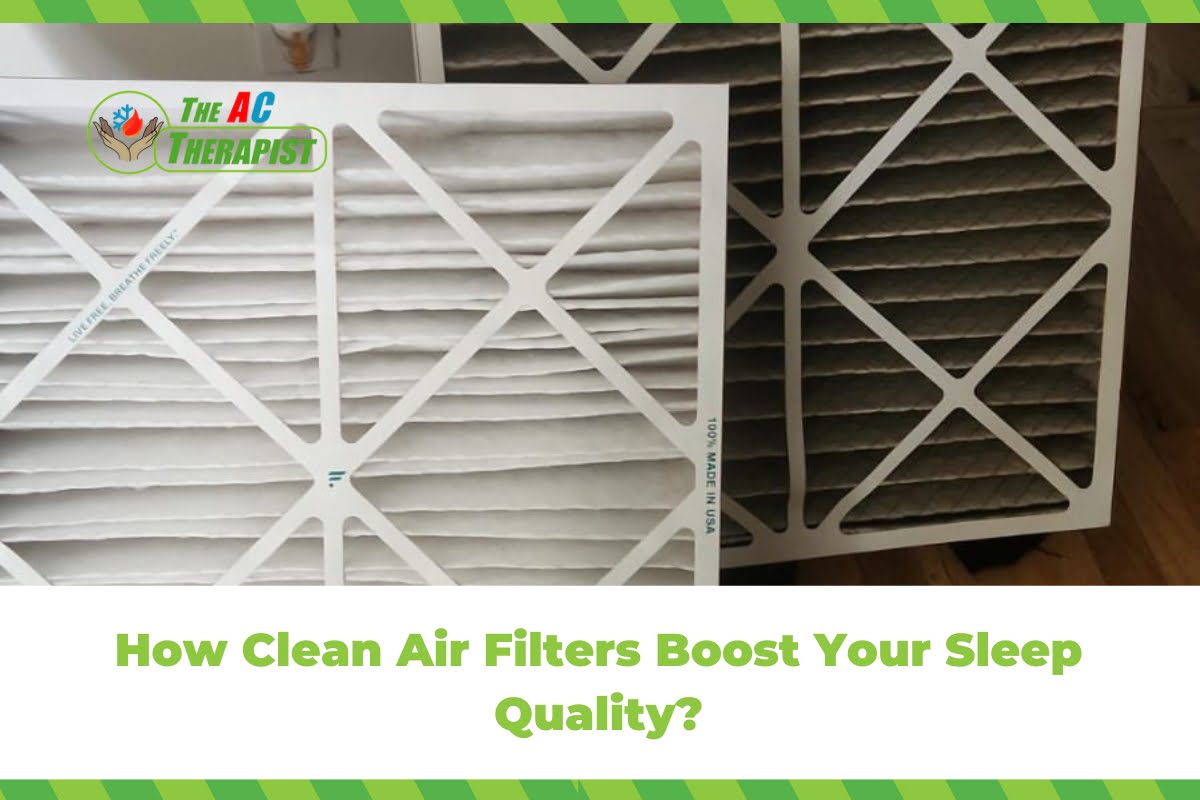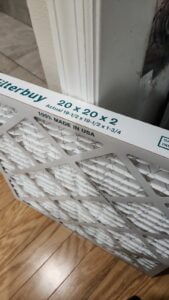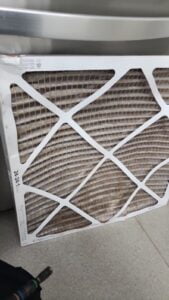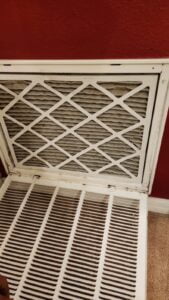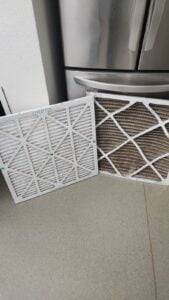How Clean Air Filters Boost Your Sleep Quality?
Clean indoor air is a cornerstone of good health and well-being. In our homes, where we spend a significant portion of our lives, the quality of the air we breathe directly impacts our physical and mental health. Poor indoor air quality can lead to a variety of health issues, including allergies, respiratory problems, headaches, and fatigue. Moreover, it can significantly affect our cognitive functions and mood, leading to decreased productivity and an overall sense of discomfort.
The impact of clean air extends into the realm of sleep quality, a critical component of our overall health. Research has shown that breathing clean, pollutant-free air throughout the night can help us fall asleep more easily, enjoy deeper, more restful sleep, and wake up feeling more refreshed. The presence of pollutants in indoor air, however, can disrupt sleep patterns, lead to sleep disturbances, and exacerbate conditions such as sleep apnea.
Air filters play a pivotal role in maintaining cleaner indoor air and, by extension, supporting better health and improved sleep quality. They work by trapping dust, pollen, pet dander, and other airborne particles that can pollute our living spaces. By regularly changing these air filters, we can ensure that our HVAC systems are effectively removing contaminants from the air, thereby creating a healthier and more comfortable indoor environment conducive to good sleep and well-being.
Understanding Air Filters and Indoor Air Quality
The quest for maintaining a healthy indoor environment begins with an understanding of air filters and the pivotal role they play in preserving indoor air quality (IAQ). In essence, air filters are the first line of defense against the myriad of pollutants that compromise the air within our homes and workplaces.
What Are Air Filters?
Air filters are components of heating, ventilation, and air conditioning (HVAC) systems, designed to trap and remove particles and contaminants from the air circulating through the system. These filters are made from various materials, including fiberglass, pleated paper, or synthetic fibers, and are engineered to capture particles such as dust, pollen, mold spores, pet dander, and bacteria.
How Air Filters Work
The working principle of air filters is relatively straightforward. As air moves through the HVAC system, it passes through the filter, which captures and holds the particles and pollutants. This process prevents these contaminants from recirculating back into the indoor environment, ensuring that the air distributed throughout the space is cleaner and healthier to breathe.
The Importance of Indoor Air Quality
Indoor air quality is a measure of the cleanliness and healthfulness of the air inside buildings and structures. It is influenced by various factors, including the presence of pollutants (chemical, biological, or particulate), ventilation rates, and humidity levels. IAQ is crucial because poor indoor air quality has been linked to a host of health problems, from short-term effects like irritation of the eyes, nose, and throat, to long-term effects such as respiratory diseases, heart disease, and even cancer. Moreover, it significantly impacts comfort, productivity, and overall quality of life.
Common Indoor Air Pollutants
- Dust and Dust Mites: Tiny particles that can provoke allergies and respiratory issues.
- Pollen: Plant particles that can trigger allergic reactions.
- Mold Spores: Fungi that can cause health problems, especially in people with respiratory conditions or compromised immune systems.
- Pet Dander: Tiny flakes of skin are shed by pets, which can cause allergies.
- Bacteria and Viruses: Microorganisms that can cause illnesses.
- Volatile Organic Compounds (VOCs): Gases emitted from certain solids or liquids, including paints, cleaning supplies, and other household products, which can cause health issues.
The Role of Air Filters in Improving Indoor Air Quality
By trapping and removing the particles and pollutants mentioned above, air filters play a crucial role in improving indoor air quality. Regularly changing these filters is vital for maintaining their effectiveness. Over time, filters become clogged with the particles they’ve trapped, which can reduce airflow and the overall efficiency of the HVAC system, leading to poorer indoor air quality and increased energy consumption.
The Link Between Clean Air and Sleep Quality
The quality of the air we breathe is not just a concern for our waking hours; it profoundly affects our sleep, which is essential for our overall health and well-being. Understanding the connection between clean air and sleep quality can illuminate why maintaining a healthy indoor environment is crucial for restorative rest.
Impact of Air Quality on Sleep
Research has increasingly shown that there is a significant link between indoor air quality and sleep quality. Various pollutants, including particulate matter, allergens, volatile organic compounds (VOCs), and carbon dioxide, can negatively impact the respiratory system, trigger allergies, and disrupt sleep patterns. Poor air quality has been associated with difficulty falling asleep, frequent awakenings, and lighter, less restorative sleep stages. The presence of these pollutants can exacerbate respiratory conditions such as asthma or allergies, leading to snoring, sleep apnea, and other sleep disturbances.
Mechanisms of Disruption
- Allergens and Respiratory Irritants: Substances like pollen, dust mites, and pet dander can irritate the respiratory tract, leading to congestion, sneezing, and coughing, which can interrupt sleep.
- Volatile Organic Compounds (VOCs): Emitted by a variety of household products, VOCs can cause headaches, dizziness, and respiratory irritation, contributing to discomfort that can hinder sleep.
- Particulate Matter: Fine particles can penetrate deep into the respiratory system, causing inflammation and exacerbating conditions like asthma, which can disturb sleep.
Benefits of Clean Air for Sleep
Improving indoor air quality can lead to better sleep outcomes by reducing the likelihood of respiratory irritations and creating a more comfortable sleeping environment. Cleaner air reduces the burden on the respiratory system, allowing for more relaxed breathing, which is conducive to falling asleep more easily and achieving deeper, more restorative sleep stages. Furthermore, reducing indoor air pollutants can decrease the risk of developing or worsening respiratory conditions that interfere with sleep, such as allergies and asthma.
Enhancing Sleep Quality Through Air Filtration
One effective strategy for improving sleep quality through cleaner air is the use of high-quality air filters in HVAC systems and the addition of air purifiers in sleeping areas. These devices can significantly reduce the concentration of airborne pollutants, creating a healthier sleeping environment. Choosing air filters with a high Minimum Efficiency Reporting Value (MERV) rating or High-Efficiency Particulate Air (HEPA) filters can be particularly effective in capturing fine particles and allergens.
Additional Benefits of Clean Air Filters
The importance of clean air filters extends beyond just improving sleep quality. Maintaining clean air filters in your HVAC system can bring a multitude of benefits that enhance your home environment, health, and even your wallet. Let’s explore the additional advantages of ensuring clean air filters are a priority in your home maintenance routine.
Enhanced HVAC Efficiency
Clean air filters are essential for maintaining the efficiency of your HVAC system. When air filters are clean, your HVAC system doesn’t have to work as hard to circulate air throughout your home. This not only prolongs the lifespan of your HVAC system but also contributes to more consistent temperature regulation and comfort in your living spaces. Regularly changing to clean air filters can prevent common problems associated with poor airflow, such as uneven heating or cooling.
Reduced Energy Costs
One of the immediate benefits of clean air filters is the potential for reduced energy costs. When air filters are clogged, your HVAC system has to expend more energy to push air through the filter. By maintaining clean air filters, you ensure that your system operates at peak efficiency, using less energy to heat or cool your home. This efficiency translates into lower energy bills, making clean air filters an investment that pays off in the long run.
Improved Overall Indoor Air Quality
Clean air filters play a critical role in improving the overall indoor air quality of your home. By effectively trapping pollutants, allergens, and irritants, clean air filters prevent these harmful particles from circulating in your living spaces. This not only supports better sleep but also contributes to a healthier environment for everyone in the home, especially for individuals with allergies, asthma, or other respiratory conditions. The regular replacement of air filters with clean ones ensures a continuous supply of fresh, clean air.
Lower Carbon Footprint
The energy savings associated with clean air filters also have a positive impact on the environment. By optimizing the efficiency of your HVAC system through the use of clean air filters, you contribute to lower energy consumption. This reduction in energy demand from your home can lead to a decrease in greenhouse gas emissions, helping to lower your overall carbon footprint. Clean air filters, therefore, play a small but significant role in environmental conservation.
Protection of HVAC System
Maintaining clean air filters is crucial for protecting the components of your HVAC system from dirt and debris buildup. Clean air filters prevent particles from entering the system, where they can cause wear and tear on motors, bearings, and other mechanical parts. This protective function of clean air filters can save you from costly repairs and extend the lifespan of your HVAC system, ensuring it continues to provide comfort and efficiency for years to come.
Tips for Maintaining Clean Indoor Air Beyond Changing Air Filters
While changing clean air filters regularly is a cornerstone of maintaining clean indoor air, several additional strategies can complement the effectiveness of clean air filters in creating a healthier home environment. Here are practical tips to ensure your indoor air remains as clean and fresh as possible, alongside the essential practice of replacing clean air filters.
Regular Cleaning and Dusting
Regular household cleaning plays a vital role in complementing the work of clean air filters. Dusting, vacuuming, and mopping can reduce the accumulation of dust, pet dander, and other particulates that clean air filters work hard to capture. By keeping surfaces clean, you minimize the amount of dust that can become airborne and subsequently need to be filtered out, allowing your clean air filters to perform more efficiently.
Use Cooking Vents
Cooking can release a significant amount of pollutants into the air, including particulate matter and gases like nitrogen dioxide. Using cooking vents or range hoods can help to remove these pollutants directly from the source, reducing the burden on your clean air filters and maintaining cleaner indoor air.
Maintain Proper Ventilation
Even with clean air filters, it’s crucial to ensure your home is properly ventilated. This can involve opening windows to let fresh air in when the outdoor air quality is good. Proper ventilation helps to dilute indoor pollutants, providing a helpful boost to the clean air maintained by your clean air filters.
Control Humidity Levels
Maintaining optimal indoor humidity levels, typically between 30-50%, can prevent the growth of mold and dust mites, both of which can degrade indoor air quality. Dehumidifiers can assist in maintaining these levels, reducing the workload on clean air filters by limiting the growth of biological contaminants.
Invest in Indoor Plants
Certain indoor plants can act as natural air purifiers, absorbing pollutants such as VOCs. While they cannot replace the need for clean air filters, they can complement the filtration process by reducing the concentration of indoor pollutants, contributing to cleaner indoor air.
Avoid Smoking Indoors
Tobacco smoke is a major indoor air pollutant, containing thousands of harmful chemicals. Avoiding indoor smoking can significantly improve indoor air quality, reducing the presence of airborne pollutants that clean air filters need to remove.
Use Natural Cleaning Products
Many conventional cleaning products contain chemicals that can degrade indoor air quality. Opting for natural or DIY cleaning solutions can reduce the emission of these chemicals, lessening the contaminant load that clean air filters need to handle, and maintaining cleaner indoor air.
Regular HVAC Maintenance
In addition to changing clean air filters, regular maintenance of your HVAC system is crucial. This can include professional inspections and cleanings to ensure the system operates efficiently, supporting the effectiveness of clean air filters in maintaining clean indoor air.
Unlocking the Secret to Restful Nights: My Transformation with The AC Therapist’s Guide to Clean Air Filters and Pure Indoor Air
As I sit down to share my journey towards achieving better sleep, I am reminded of the profound impact that something as seemingly simple as air quality can have on our lives. Partnering with The AC Therapist has opened my eyes to the critical importance of clean air filters and how they serve as the bedrock for cleaner indoor air and, consequently, restful sleep.
The adventure began with an awakening to the fact that the air we breathe indoors is often laden with unseen pollutants and allergens. These invisible intruders were not just compromising my health but were stealthily stealing my sleep. The AC Therapist illuminated the path to reclaiming my nights, emphasizing the necessity of changing air filters regularly as a foundational step towards purifying my indoor environment.
With each replacement of a clean air filter, I noticed incremental improvements in my nightly rest. It was a revelation to experience how cleaner air could ease my journey into sleep, allowing me to enjoy deeper and more rejuvenating slumber. These changes did not occur overnight, but rather unfolded gradually, as each clean air filter worked tirelessly to remove the contaminants that had once disrupted my peace.
But my education and transformation didn’t stop with just swapping out air filters. The AC Therapist introduced me to a broader vision of indoor air quality management. I learned the significance of integrating other practices such as thorough cleaning, utilizing cooking vents to minimize indoor pollutants, and embracing proper ventilation techniques. These practices, alongside the vigilant replacement of clean air filters, created a synergistic effect, enhancing the quality of the air I breathed and the sleep I cherished.
The guidance didn’t end there. The AC Therapist stressed the importance of controlling humidity levels to ward off mold and dust mites and the benefits of incorporating indoor plants to naturally purify the air. Additionally, steering clear of indoor smoking and opting for natural cleaning products further reduced the load on my clean air filters, ensuring they could perform at their best.
This journey has been transformative. No longer do I spend my nights in a restless battle for sleep? Instead, I am greeted by a sanctuary of clean air, thanks to the diligent changes of air filters and the comprehensive approach to indoor air quality championed by The AC Therapist. The difference in my sleep quality is night and day—literally. It’s a testament to how optimizing our indoor environment can have a cascading effect on our health and well-being.
In conclusion, my journey with The AC Therapist has taught me that the path to restful sleep and improved health is not paved with quick fixes but with a commitment to maintaining clean air filters and cultivating a cleaner indoor environment.
I am profoundly grateful for the expertise and support provided by The AC Therapist, which has not only transformed my sleep but has also enhanced my quality of life. To those seeking solace in their quest for restful nights, remember that cleaner air, facilitated by clean air filters and mindful practices, could very well be the key to unlocking the deep, restorative sleep we all deserve. Let us breathe easy and embrace the night, confident in the sanctuary we’ve created through clean air and peace of mind.

